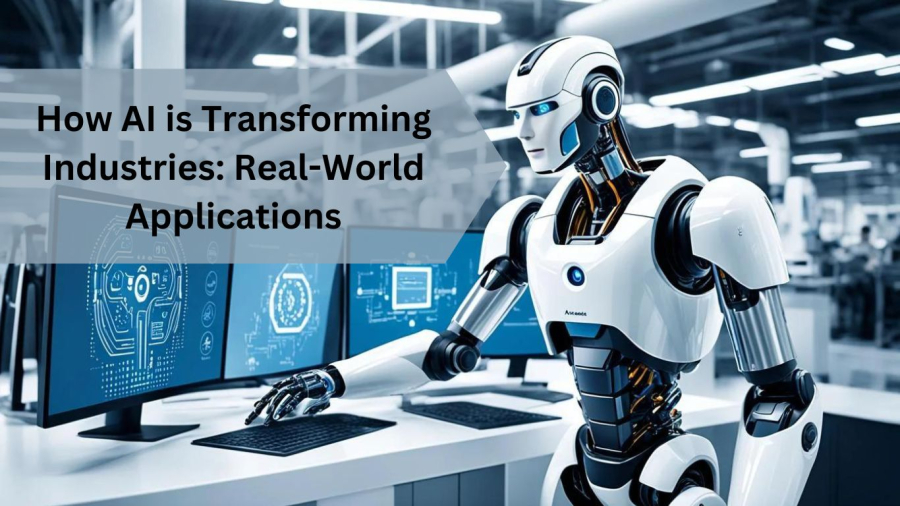AI in Healthcare
Diagnostics and Imaging
In healthcare, AI is significantly enhancing diagnostic accuracy. AI-powered tools can analyze medical images faster and more accurately than traditional methods, aiding in early detection of diseases. For instance, AI algorithms can detect abnormalities in X-rays and MRIs with high precision, which helps in timely intervention and better patient outcomes.
Personalized Medicine
AI’s ability to analyze vast amounts of data allows for the customization of medical treatments. By evaluating genetic information and patient history, AI can help design personalized treatment plans. This approach not only improves the efficacy of treatments but also minimizes adverse effects, paving the way for a more personalized healthcare experience.
AI in Finance
Fraud Detection
In the finance sector, AI is a critical tool for detecting and preventing fraud. Machine learning algorithms analyze transaction patterns to identify unusual activities that could indicate fraudulent behavior. This proactive approach helps in minimizing financial losses and enhancing security.
Algorithmic Trading
AI has revolutionized trading strategies with algorithmic trading. AI systems analyze market data in real-time to make split-second trading decisions. This not only improves trading efficiency but also allows for more sophisticated investment strategies that were previously impossible.
Customer Service
AI-driven chatbots and virtual assistants are transforming customer service in finance. These AI tools provide instant responses to customer queries, handle routine tasks, and offer personalized advice, enhancing the overall customer experience and operational efficiency.
AI in Retail
Personalized Shopping Experiences
Retailers use AI to create personalized shopping experiences through recommendation engines. By analyzing customer behavior and preferences, AI suggests products that align with individual tastes, leading to increased sales and improved customer satisfaction.
Inventory Management
AI helps retailers manage inventory more efficiently by predicting demand and optimizing stock levels. This reduces the risk of overstocking or stockouts, ensuring that customers have access to the products they want without unnecessary surplus.
Customer Insights
AI-powered analytics provide deep insights into customer behavior. Retailers can track purchasing patterns, preferences, and feedback, allowing them to tailor marketing strategies and improve product offerings based on real-time data.
AI in Manufacturing
Predictive Maintenance
In manufacturing, AI is used for predictive maintenance. By analyzing data from machinery, AI can predict when equipment is likely to fail, allowing for timely maintenance. This reduces downtime, prevents costly repairs, and ensures smoother operations.
Quality Control
AI enhances quality control by inspecting products for defects more accurately than human inspectors. Advanced computer vision systems detect flaws and ensure that only high-quality products reach the market, improving overall product reliability.
Supply Chain Optimization
AI optimizes supply chains by analyzing data to forecast demand, manage inventory, and streamline logistics. This results in more efficient operations, reduced costs, and better coordination across the supply chain.
AI in Transportation
Autonomous Vehicles
AI is driving the development of autonomous vehicles. Self-driving cars use AI to navigate roads, avoid obstacles, and make real-time decisions. This technology promises to improve road safety and transform transportation systems.
Traffic Management
AI helps optimize traffic flow in urban areas by analyzing traffic patterns and adjusting signals accordingly. This reduces congestion, minimizes travel times, and enhances the efficiency of transportation networks.
AI in Education
Personalized Learning
AI enables personalized learning experiences by adapting educational content to individual student needs. Intelligent tutoring systems provide customized feedback and resources, helping students learn at their own pace and improving educational outcomes.
Administrative Automation
AI automates administrative tasks in educational institutions, such as grading, scheduling, and managing student records. This reduces the administrative burden on educators and allows them to focus more on teaching.
Student Engagement
AI tools enhance student engagement by providing interactive and immersive learning experiences. Virtual classrooms and AI-driven educational games make learning more engaging and effective.
AI in Agriculture
Precision Farming
AI contributes to precision farming by analyzing data from various sources, such as satellite images and soil sensors. This helps farmers optimize crop management, increase yields, and reduce resource usage.
Pest and Disease Detection
AI tools detect pests and diseases in crops early, allowing for timely intervention. This helps in minimizing damage and improving crop health, leading to better agricultural productivity.
Farm Management Systems
AI-driven farm management systems provide insights into operational efficiency, crop performance, and resource allocation. These systems help farmers make informed decisions and manage their farms more effectively.
AI in Entertainment
Content Recommendations
AI powers content recommendation engines on streaming platforms, suggesting movies, shows, and music based on user preferences. This enhances user experience by offering relevant and personalized content.
Creative AI
AI is being used to create art, music, and other forms of creative content. These AI systems generate new and innovative works, pushing the boundaries of creativity and providing new tools for artists.
User Experience Enhancement
AI enhances user experience by personalizing interactions and improving engagement. Chatbots, virtual assistants, and interactive features create more engaging and enjoyable experiences for users.
AI in Energy
Smart Grids
AI contributes to the development of smart grids, which optimize energy distribution and usage. By analyzing data from energy sources and consumers, AI ensures efficient energy management and reduces waste.
Predictive Maintenance
In the energy sector, AI predicts maintenance needs for equipment, such as turbines and generators. This proactive approach minimizes downtime and ensures reliable energy production.
Energy Consumption Optimization
AI helps in optimizing energy consumption by analyzing usage patterns and recommending ways to reduce energy waste. This leads to cost savings and more sustainable energy practices.
The Role of AI Development Companies
AI development company play a crucial role in advancing AI technologies. They develop innovative solutions, conduct research, and implement AI systems across various industries. Their expertise drives the adoption of AI and helps businesses leverage its benefits.
Conclusion
AI is revolutionizing industries by enhancing capabilities, improving efficiencies, and creating new opportunities. From healthcare to finance, AI’s impact is profound and far-reaching. For instance, offshore software development companies are increasingly leveraging AI to deliver innovative solutions and streamline operations.

